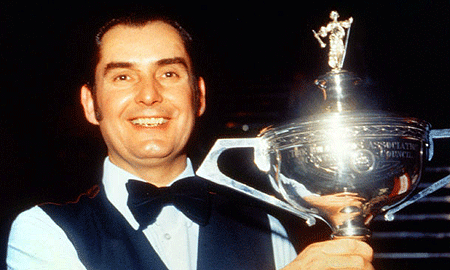
The Crucible Theatre in Sheffield has become an annual sporting shrine for snooker fans. This year it hosts the World Championship for the 38th time but the game’s premier event had various homes from its first staging in 1927 until 1976, the year before it moved to the Steel City.
On the 25th anniversary of that 1976 event I wrote a piece for the official World Championship programme, which I reproduce below to remind everyone that the sport wasn’t always cash-rich and, however much people complain now about conditions, things have vastly improved…
It may only be a short journey from the Wythenshawe Forum in Manchester to Sheffield’s Crucible Theatre but in snooker terms the move to its current home was like a trip to another planet.
Today, the players can rightly take it for granted that all aspects of the tournament will run smoothly. The tables are the best in the world; the television lights and cameras are standard and unobtrusive; the audience is well behaved and respectful. But for Ray Reardon these simple conventions were sadly lacking in 1976.
The Wythenshawe Forum had hosted one half of the main draw with Middlesbrough Town Hall staging the other. Reardon came through to face Alex Higgins in the Manchester final with a cheque for £3,500 up for grabs.
For a start, the match table was not up to standard. Five of the six pockets were not regulation size and potting down one side cushion was ridiculously easy while any attempt down the opposite rail was near impossible.
The venue did not lend itself to television and the glare from the lights made playing conditions very difficult. Reardon and Higgins understandably wanted the world final to be a proper test but without being able to see the balls properly, the match veered dangerously close to farce.
Fortunately, at the conclusion of the first session, the dazzle was reduced and the final could proceed.
Reardon led 8-5, trailed 10-9 then led 15-11 during an engrossing encounter marred by some unnecessary barracking from a section of the audience unhappy that the players had complained about conditions.
The players were also not best pleased with several of Bill Timms’ refereeing decisions and, on the final night, John Williams donned the white gloves to take charge.
Higgins cut the gap to 15-13 but Reardon won the next four frames and later led 24-15 to emphatically pull away from the Hurricane, eventually winning 27-16.
“I’m afraid the conditions were not what you would call perfect,” Reardon reflected. “I don’t want to remember the bad things but Embassy deserved better for their first tournament because they turned out to be super sponsors.
“I supposes it was a learning process for everyone. Snooker was becoming a big attraction on television and it was obvious that it needed conditions that could do it justice.”
In Snooker Scene, Clive Everton wrote in defence of Reardon’s protestations:
“Reardon’s ‘objections’ suffered some distortions. He did not object to young people; he did object to children scurrying about in his vision while the match was in progress. He did not object to people smoking; he did object to thoughtless spectators who struck matches and cigarette lighters in the line of sight as he was about to play a shot. He did not object to people drinking; he did object to a constant distracting traffic to and from the bar. Certain imperfections, which may be acceptable in a club exhibition, are not acceptable in a World Championship, with not only substantial prize money but an incalculable amount of status and prestige at stake.”
Reardon won six world titles between 1970 and 1978. He remembers the early days with affection.
“The first one I won was in 1970 and that was my fondest memory, probably followed by 1975 when I beat Eddie Charlton 31-30.
“But winning at Wythenshawe was a great achievement because I was up against Alex and he was so incredibly unpredictable. He was a wizard and you never knew what he was going to do next. Many people don’t realise what a brilliant safety player he was because they remember him for all the outstanding pots and clearances he used to pull off but his defensive game was superb as well.”
Reardon believes such an inauspicious setting was just what the championship needed. With a new sponsor to impress, he says that the event had to sharpen up its ideas.
“There was no way Embassy were going to be happy if the championship stayed at the Wythenshawe Forum. They were unlikely to remain with snooker unless we got a proper home that could accommodate television,” he said.
“We went to Sheffield, we found the perfect place. Everything changed after that. The BBC came in and gave it over 100 hours coverage when we had only got bits and pieces before.
“More and more people became interested in the sport and its players and the money started flowing in. It all happened fairly quickly and it was nice to have been involved at the beginning of the boom.
“People often ask me if I wish I’d been at the top of my game when all the money came into snooker but I’m satisfied with my record as it is.
“Some say that there is too much money in the game but the amount going to the young players of today just proves snooker’s popularity.
“Standards have also been driven upwards. Back in the seventies we had some tremendous potters but the players of today have taken the game to another level so they deserve their rewards."